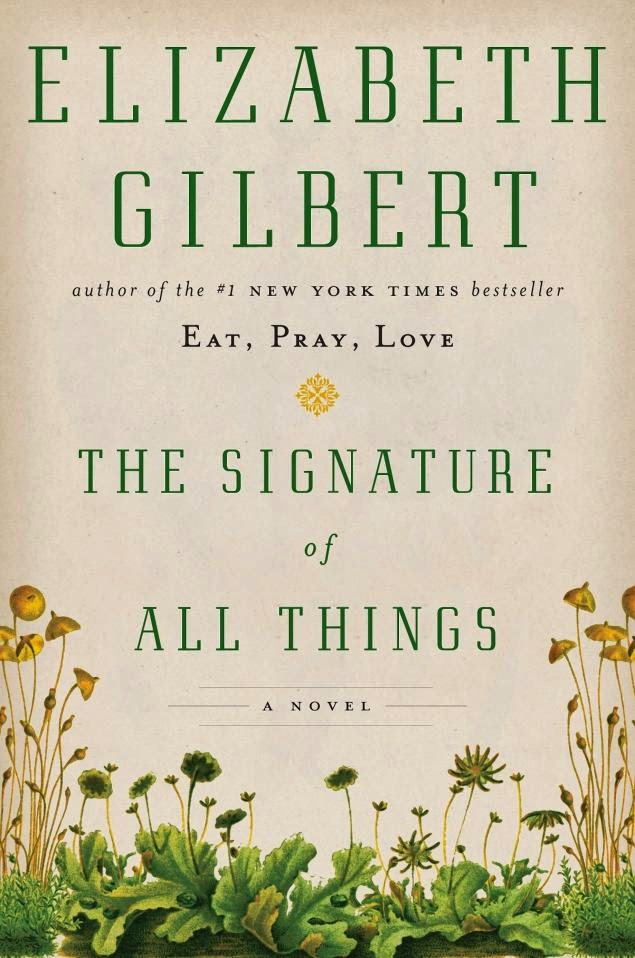The Signature of All Things, by Elizabeth Gilbert, is an epic tale that chronicles the life of a fictional 19th century botanist--Alma Whittaker. The scope of the book spans much of the eighteenth and nineteenth centuries in which faith and science intermingled and ultimately, collided.
Alma comes from a long line of botanists. Her father, Henry Whittaker, was the son of the "Apple Magus"of the Royal Botanic Gardens at Kew. A simple man, Henry's father was the chief caretaker of the king's trees in the 1770s. Henry acquires his love of plants from this humble man, yet he assumes none of his scruples.
Henry considers his father a fool. He notes that his father has earned neither wealth nor position for his loyalty and devotion. Thus he scoffs at his father's amazing gifts at cultivating fruiting trees. In Henry's eyes, his father is a mere servant to the king and the gentry. In particular, Henry compares his father to his dad's employer, Sir Joseph Banks, chief botanist for Sir Captain Cook's HMS Endeavor. By the age of 23, an inheritance made Banks one of the richest men in England. Aside from wealth, Banks was a fearless adventurer, collecting plants from all over the world in the hope of making Kew a national treasure.
Henry is only 13 when he begins stealing rare plants from Kew Gardens and selling them to collectors whom Banks has turned away. Finally, after three years, Henry is caught. Rather than press charges, Banks decides to make use of Henry's knowledge and fearlessness. In 1776, he arranges for Henry to work as a hand on Captain Cook's third voyage around the world. He is to work under the tutelege of botanist David Nelson, a competent gardener at Kew. The next three years at sea will prove pivotal to Henry's knowledge of plants and trees. Gilbert's descriptions of life at sea are depicted in graphic detail. Elizabeth Gilbert is truly Dickensian as she describes Henry's experiences and their effect upon his moral development.
When Henry returned from his voyage, he is spurned by Banks. Henry breaks off all contact with him and journeys to Holland. There, he marries a Dutch woman, not for money (which he now has) but for social position.Soon afterward, he leaves Europe and settles down in Philadelphia. "By 1800, Henry is "the richest man in Philadelphia and one of the richest men in the Western Hemisphere." (p. 47) In that year, his daughter, Alma Whittaker, is born. Gilbert tells us, "...it was as though she was born to a new kind of creature entirely, such as the world had never before seen: a mighty and newly minted American sultan." (p. 47)
The rest of the book, from page 50 to 500, tells the amazing story of the life of Alma Whittaker, a woman who grew up in a world of books and privilege to become a renowned botanist. Over the ensuing decades, her research leads her into the emerging realm of evolution. Her research brings her into contact with the evolutionary scholar, Alfred Russell Wallace. Both he and Charles Darwin come alive in the pages as Gilbert weaves history into fiction.
But Alma is not simply an intellectual character. She is a highly passionate woman who has tasted only of love's losses. Brilliant but homely, her lack of romance is seen largely through the frame of the time period in which she lives.
If you are a fan of
historical fiction or an armchair traveler seeking exotic locales, you
will enjoy Elizabeth Gilbert's epic tale. Embark on this journey
featuring an unusual family, a sympathetic heroine, and a time period in
which the paradigms of creation were called into question. The
combination of humor and pathos, beautiful deckle-edged pages and lovely
sketches make this book a must on your reading list.
Download the ebook
Check Our Catalog


No comments:
Post a Comment
We review all comments and reserve the right to remove comments based on: profanity, irrelevance, spam, personal attacks and anything else contrary to our guidelines.